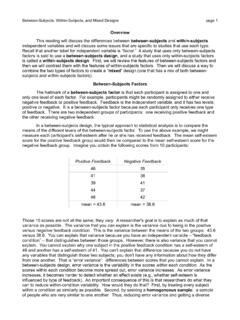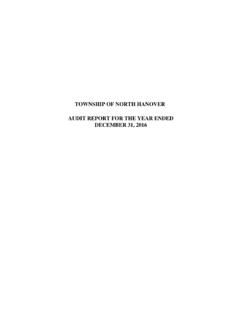Transcription of CHILD OBSERVATION ASSIGNMENT Child ... - Hanover College
1 PSY 244 CHILD OBSERVATION ASSIGNMENT For this ASSIGNMENT , you will have an opportunity to observe a CHILD in a naturalistic setting. You will conduct your first OBSERVATION early in the semester, before you have encountered many of the theories or findings from developmental research. You will conduct your second OBSERVATION later in the semester and will be asked to apply information learned in the course to what you observe. CHILD OBSERVATION (Time 1 and Time 2) Observe an infant, toddler, preschooler, or elementary school age CHILD ( , birth to 10 years) in one of his or her naturalistic settings. You may observe the CHILD in his or her home, a daycare center or family daycare, preschool program, or school program. The CHILD who you observe cannot be a CHILD with whom you have lived or are living. Please schedule your visit by calling in advance and be sure to keep the appointment.
2 Also make sure you obtain written consent from the parent, teacher and/or caregiver at the home or center/daycare/school before you conduct the OBSERVATION (see Consent Form below). You will need to hand in the signed consent form with your ASSIGNMENT . For this ASSIGNMENT , it is NOT permissible to observe a CHILD in a naturalistic setting like a park or shopping mall because you will not know for sure how long the CHILD will stay in that setting and there might not be an adult from whom you can gain permission. Remember that you are there to observe, not to interact with the CHILD (ren) or the adult(s). Try to avoid engaging the CHILD (ren) in a conversation. If a CHILD approaches you and wants to interact with you, politely inform the CHILD that you are working and that you cannot talk or play right now. Please respect the confidentiality of the CHILD (ren) and adult(s) that you observe by referring to them by first initials only ( , J ) or by a pseudonym in your written paper.
3 Plan to spend about one hour observing the CHILD . Take detailed notes, keeping in mind the requirements of the written part of this ASSIGNMENT (see below), and save them. These notes will help you write the paper following the OBSERVATION and you will need to hand in your notes with your ASSIGNMENT . Paper ASSIGNMENT (Time 1) Prepare a 3-page double-spaced paper (not including your OBSERVATION notes) that demonstrates your ability to be a critical observer of children s behavior. Paper should be typed in 12 point font with 1 inch margins. Be sure to include the following in your paper: 1. A description of significant elements of the CHILD and the setting in which the OBSERVATION took place. Although you do not need to address all of the following, some examples of things to include would be: What is the age and sex of the CHILD that you observed?
4 Where and with whom did the OBSERVATION take place? Was anyone else present during the OBSERVATION ? How many children were present? How old did they seem to be? How many were boys and how many are girls? How many teachers and/or other adults were present? How was the environment arranged ( , furniture, materials, activities afforded, etc.)? What time of day did the OBSERVATION take place and for how long? 2. A description of the CHILD s developmental skills and behaviors. Include specific examples of the CHILD s developmental skills and abilities in the following areas: (a) sensory/perceptual development; (b) motor and physical development; (c) cognitive and/or language development; (d) social and/or emotional development. Be sure to include at least 2 of these specific areas of development in your paper. 3. A description of the interactions between the CHILD and his or her caregiver and/or peers.
5 When describing the social interactions of the CHILD , discuss the quality of the interactions ( , positive or negative aspects) and talk about how you think these kinds of interactions may affect the development of at least one of the CHILD s developmental skills. 4. Be sure to attach a copy of the notes that you took during the OBSERVATION and the signed consent form to your paper. As long as the notes are legible, you do not have to type them. Papers that do not include notes taken during the OBSERVATION and a signed consent form will receive a deduction of one full letter grade. Paper ASSIGNMENT (Time 2) Prepare a 3-page double-spaced paper (not including your OBSERVATION notes) that demonstrates your ability to be a critical observer of children s behavior as well as your ability to apply course material about children s development to what you have observed.
6 Papers should be type in 12 point font with 1 inch margins. Your paper should include all of the elements above. In addition, you must link your observations of the CHILD to information from course material ( , texts and lectures). Be explicit about how the course material applies to what you have observed by applying specific terms and concepts from course material, citing page numbers in the text(s), and/or referring to specific information from the lectures. Consent Form CHILD OBSERVATION _____ is a student in the Childhood and Adolescent Development course at Hanover College . All students are being asked to observe a CHILD in his or her home, daycare center/family daycare, preschool program, or school program. The purpose of the OBSERVATION is to help students learn about aspects of children s development by observing a CHILD in one of his or her naturalistic settings.
7 The OBSERVATION should take approximately one hour to complete and does not require you or the CHILD (ren) to interact with the student. In fact, we hope that the student will remain as inconspicuous as possible during the OBSERVATION . Although the student will be taking notes during the OBSERVATION , at no time will you or any of the children in your home or program be identified by name. If you agree to have the student observe a CHILD in your home or program, please sign your name and complete the information below. _____ Signature _____ Name (please print name) _____ Date _____ Name of program or school (if applicable) If you have any questions about the OBSERVATION , please contact Ellen Altermatt, the instructor of the course, at 812-866-7317. Thank you for your help! Ellen Altermatt, Department of Psychology Hanover College Hanover , IN 47243 Phone: Consent Form CHILD OBSERVATION _____ is a student in the Childhood and Adolescent Development course at Hanover College .
8 All students are being asked to observe a CHILD in his or her home, daycare center/family daycare, preschool program, or school program. The purpose of the OBSERVATION is to help students learn about aspects of children s development by observing a CHILD in one of his or her naturalistic settings. The OBSERVATION should take approximately one hour to complete and does not require you or the CHILD (ren) to interact with the student. In fact, we hope that the student will remain as inconspicuous as possible during the OBSERVATION . Although the student will be taking notes during the OBSERVATION , at no time will you or any of the children in your home or program be identified by name. If you agree to have the student observe a CHILD in your home or program, please sign your name and complete the information below. _____ Signature _____ Name (please print name) _____ Date _____ Name of program or school (if applicable) If you have any questions about the OBSERVATION , please contact Ellen Altermatt, the instructor of the course, at 812-866-7317.
9 Thank you for your help! Ellen Altermatt, Department of Psychology Hanover College Hanover , IN 47243 Phone.





